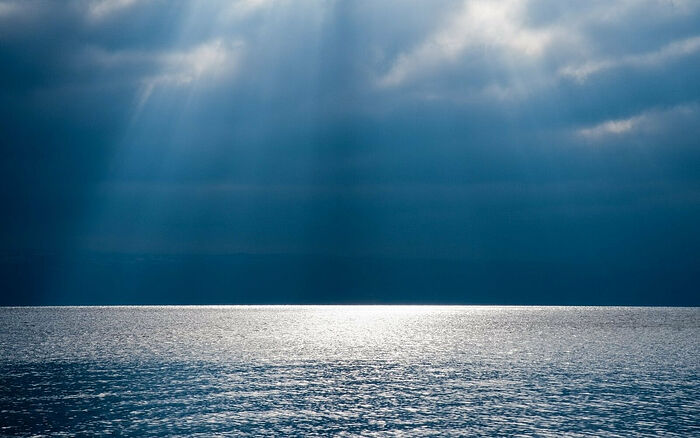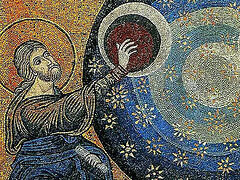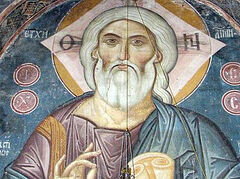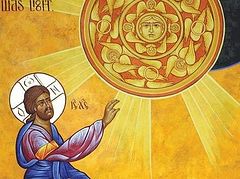 Photo: catherineasquithgallery.com
Photo: catherineasquithgallery.com
I have just now finished re-reading the seminal 2007 book The Language of God, written by physician-geneticist and Christian Francis S. Collins, the man under whose leadership the Human Genome was finally mapped in 2003. It is an inspiring read. One might imagine that it was the overwhelming proof for evolution that undergirds a non-historical reading of the first chapters of Genesis. In my own case the scientific proof of evolution formed no part of my regarding the Genesis creation stories as non-historical. I rejected an historical reading of the text because I took the text with absolute seriousness as the Word of God. That is, I took seriously what it had to say about the sea.
We find the sea in the second verse of the first creation story, in Genesis 1:2. The chapter begins, “In the beginning God created the heavens and the earth, and the earth was tohu and bohu”—often (misleading) rendered “formless and void”, but better rendered as “desolate and empty”.
Then comes the reference to the sea: “Darkness over the face of the deep [Hebrew tehom], and the Spirit of God was brooding over the face of the waters [Hebrew mayim].
The word tehom is used in Isaiah 51:10 to describe the Red Sea; in Jonah 2:5 it describes the Mediterranean Sea; in Ezekiel 26:19 it also refers to the sea. The word mayim is simply the usual plural word for water (compare its use in Exodus 17:6, where water came from the rock). We can understand the nature of this tehom, these mayim, when we read the verses that follow.
God did not begin to create until the first day of creation, narrated in verse 3, when He said, “Let there be light”. After that, on the second day of creation, God said, “Let there be a raqia’ in the midst of the waters, and let it separate the waters from the waters.” The narrator goes on to say, “And God made the raqia’ and separated the waters which were below the raqia’ from the waters which were above the raqia’, and it was so. And God called the raqia’ “heavens” (in the plural; Hebrew shamayim).
What was this “raqia’”? The word is cognate with the verb raqa, which means “to hammer out”, the verb used in Exodus 39:3 to describe the process of hammering out gold plate for use in the Tabernacle shrine. Here the noun refers to the solid sky, something strong and sturdy enough to hold up a large amount of water.
This was in keeping with ancient cosmology, which considered that there was a sea up above the clouds, which sea was the source of rain that came down through the windows of the raqia’ and which were caught by the buckets of clouds (compare Genesis 8:11), and that the sky was solid enough to keep the sea up there safely away from us. This belief is reflected in Job 37:18, which describes the sky [Hebrew shehaqim] as “hard as a molten mirror”.
We continue with the creation narrative. On day three God said, “Let the waters under the heavens be gathered together into one place, and let the dry land appear”. The narrator then related, “And it was so. God called the dry land ‘earth’, and the waters there were gathered together He called ‘seas’.”
Here we need to read carefully, determined to take the text seriously and not import our own scientific understanding into it. Note that the waters down here below that were gathered together and called “seas” were exactly the same waters that were just separated from the waters pushed up above and kept away from us by the raqia’. Note too that these waters, both those above the raqia’ and those down here below the raqia’ which we experience as the seas, were the waters over which the Spirit of God brooded before creation began.
Let us connect the narrative dots: what we experience now as “sea water” once existed before creation began. This was the tehom that existed when everything was tohu and bohu. Note too that God did not create the dry land; the dry land simply appeared when God gathered the waters under the heavens into one place, thus making what we call “seas”. According to the text, the dry land was already there, though it was useless because it was submerged under the waters of the primordial deep, the waters of the sea.
This means that, according to this understanding, the seas are vestiges of the original chaos that existed before God began to create. That would explain the Biblical ambivalence to the sea, such as in Job 38:11 where it says that God halts the progress of the sea and stops it from encroaching on the land. According to this text, God is not just establishing beach front property, but protecting His creation from being overwhelmed by chaos. It also explains why Revelation 21:1 says that in the new heaven and new earth, “there is no longer any sea”.
The Genesis picture of creation may not be quite the one actually held by those defending its scientific historicity, but it is what the text actually says, and for those who like myself believe it to be the Word of God, it must be taken seriously. This picture portrays the sea as covering everything, making civilization and life on earth impossible.
This understanding of the sea well accords with ancient Near Eastern cosmology. For example, in the Enuma Elish, the Babylonian creation story of Marduk’s supremacy, it says, “When above the heaven had not yet been named, and below the earth had not yet been called by a name, when Apsu primeval their begetter, Mummu and Tiamat who gave birth to them all, still mingled their waters together…at that time the gods were created within them”. In this story Apsu was the sweet-water ocean, Tiamat the salty ocean, and Mummu the mist arising from them. In this story, before anything was created, all was sea.
We see this too in another creation story. It begins, “A holy house, a house of the gods in a holy place, had not been made, a reed had not come forth, a tree had not been created…all the lands were sea.” The Genesis story accords with this ancient view of the sea as the primordial chaos from which the world and its peoples arose, and shared the view of the sea common at that time.
In the same way, the rest of the Bible shared the prevailing view of the ancient Near East that the sun as moved across the sky (e.g. Psalm 19).
It was the same with the Biblical authors’ understanding of the functions of the heart and the kidneys: like others back then, they believed that the heart was where thought originated, and the kidneys were the source of emotion. Thus Psalm 26:2 which reads, “Examine me, Yahweh, and try me; test my kidneys and my heart!” The brain, by contrast, was not the home of thought or emotion; the ancients believed it was comparatively insignificant, which is why while the Egyptians took care to preserve other organs in the process of mummification, they just threw the brain away.
In other words, the Biblical authors did not vary significantly from other peoples in their world in terms of science and cosmology. The lessons the Biblical authors offered were the crucial lessons pertaining to God and His ways with His people, not lessons pertaining to astronomy or anatomy.
It is therefore a mistake of exegesis and interpretation to read the Genesis creation stories as imparting accurate information about the physical beginning of our world. That was never its main intent. We should not be shocked or dismayed when those stories narrate that all was sea before God began to create, or that daylight did not come from the sun, or that flowers did not depend upon photosynthesis to blossom, any more than we should be shocked or dismayed when Psalm 19 describes the sun moving across sky. The lesson to be learned from those texts is that the God of the Hebrews created all that exists, and that He alone therefore is worthy of trust and worship.
Seeing the sea for what it is in the creation story provides a clue about how we should read the story as a whole: we read it as a story which uses the cosmology it shared with other cultures as the backdrop for its own unique lessons about its covenant God. We must not force the text to say what it doesn’t say, nor ignore what it does say when we find it disconcerting to our fundamentalist reading of the Bible. Rather, we must let it say what it says, since it is the Word of God. Instead of altering the meaning of the text, we should instead alter our imperfect understanding of how to interpret it. The text is sovereign and supreme. If it cannot be squared with a fundamentalist reading of it, it is our fundamentalism that has to go. Anything less is profoundly disrespectful to the sacred Scriptures we profess to reverence.




